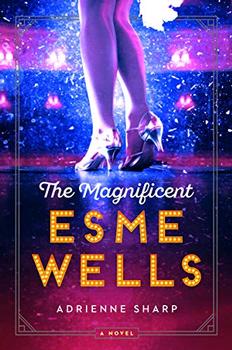Summary | Excerpt | Reading Guide | Reviews | Beyond the Book | Readalikes | Genres & Themes | Author Bio

Las Vegas
1945
1
MY FATHER AND I first drove out to Vegas with Benny Siegel in late summer, 1945, all three of us covered with fine brown sand by the time we got there. We shook it from our clothes and our hair and swept it from the seats, the floor, even the dashboard of Mr. Siegel's little red coupe convertible. And when we were done sweeping, Mr. Siegel offered me his hand with his manicured nails to help me out of the cramped little backseat where no one but a child could possibly fit, his face jubilant and eager, as if he were about to show us some great prize. I jumped from the car, all excited, only to gaze with my father and Benny at the blank acres that held the ruins of some old motel where the Flamingo Club and hotel would soon be built.
That was the prize. The unformed future.
The landscape was otherwise empty, except for the carcass of a prairie dog, a collapsed bundle of dull fur and bones. I looked around for something else to focus on and when I found it, I squinted to see the shapes better—not cacti, but the El Rancho and the Last Frontier, the casinos built before the war, the only things in sight, little specks far down the highway that would eventually be called the Strip.
It took less than thirty minutes for my face to burn a deep red while Mr. Siegel and my father walked the site. I hadn't worn a hat, just one of my mother's big silk scarves. It was seventy degrees back in Los Angeles, but a hundred and five here. I fanned myself futilely with my hands while Mr. Siegel pointed out to my father where the hotel would lie. They were all smiles, the two of them with their movie-star faces, dark hair combed back, dapper in their checked sports jackets. Jackets! Even as a child, I'd noticed that Mr. Siegel liked to surround himself with handsome, well-tailored men, the better to share his vision of a prosperous future. The war was over, he was telling my father, VJ Day an explosion of flags and confetti and bonfires and cars with the letters vj painted on them cruising and honking their way down the Los Angeles streets, and now, according to Benny, every G.I. and his wife were going to be jumping into those cars looking for fun and adventure. And the town of Las Vegas was going to be that adventure, a glamorous destination.
Really.
Because to me, Las Vegas felt like a punishment. The dusty superheated ground quickly burned through the soles of my espadrilles. How long could they talk and look at nothing? At one point, I tried to get back into the car, but that was worse. In half an hour, it had become a killing box. There was no shade. None. And we hadn't rented a hydrofan air conditioner to hang on the window of the car, either. We'd driven east with the top down. My father's face turned death-ray red, but still the men walked and talked. I tried to get my father to look my way, but he wouldn't. He only had eyes for Mr. Siegel. Here be the pool—I wish! I'd jump right in it!—the lobby, the restaurant, the casino where my father would soon manage the off-track betting. An upscale gambling palace, a miracle, certainly, for just when my father had come to understand that Los Angeles was never going to make him his fortune, another city appeared in the east, new mirage, all for him.
Mirage was right.
You have to understand that back then, Los Angeles was everything. Vegas, in the early forties, was not much of anything. A small oasis, a railway depot, a little grid of streets by the tracks and then emptiness. Small town. Big desert. Big sky. Grit. Heat. Distant mountains. Stunted brown-needled cacti. Sagebrush. And Block 16, the red-light district that serviced the workers from the dam and the mines, with its gambling and its liquor and its girls, who sat on wooden chairs by the open doorways of their concrete-block shanties, waiting for customers.
From the book: The Magnificent Esme Wells by Adrienne Sharp. Copyright © 2018 by Adrienne Sharp. Reprinted courtesy of Harper, an imprint of HarperCollins Publishers.
In war there are no unwounded soldiers
Click Here to find out who said this, as well as discovering other famous literary quotes!
Your guide toexceptional books
BookBrowse seeks out and recommends the best in contemporary fiction and nonfiction—books that not only engage and entertain but also deepen our understanding of ourselves and the world around us.